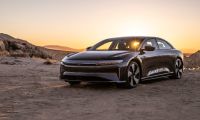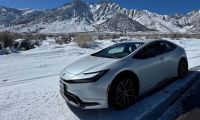Toyota has built its reputation on quality, durability, and reliability. The “Ask someone who owns one” campaign was created specifically because Toyota knew that its owners were getting much better than average reliability compared to other brands. When it comes to modern Toyota’s the trend is to move to all-hybrid drivetrains. The Venza and Sienna are just the latest of Toyota’s vehicles to be offered only as a hybrid (following the success of the Prius). The popularity of the Prius, RAV4 Hybrid, RAV4 Prime, and Highlander Hybrid are enhanced due to the reliability of the vehicles. That reliability is in no small part due to what Toyota got rid of.
Related Story: Study Concludes Toyota Hybrids Have Most Satisfied Customers - Here's How Tesla Ranked
Here is a quick glance at a few items that you won’t find in a Toyota hybrid vehicle. You know the list well. There are things in your previous vehicles that lightened your wallet. Our examples are based on the latest RAV4 Hybrid and RAV4 Prime models. Tell us if you think you will miss repairing ay of these pain in the neck items.
Review: 2021 Toyota Venza - RAV4 Hybrid Gets A Fraternal Twin
Toyota Hybrid Transmissions – No Gears, No CVT Belts
Toyota hybrids don’t rely on conventional geared transmissions or even the troublesome belt-driven CVTs in many new vehicles. Rather, Toyota has its own unique way of transferring the engine and motors’ power to the wheels. No fluid changes are required in normal use. That saves you hundreds over the life of the vehicle.
Toyota Hybrids – No Starter
Toyota hybrids don’t use conventional starter motors. Instead, the engine is started by Toyota’s motor-generator. This item has proven extremely reliable in use over many years of service. Toyota includes this item in its powertrain warranty. Most automakers exclude the starter from theirs. For a reason.
Toyota Hybrids – No Alternator
Toyota hybrids don’t use alternators. The alternator in my own Subaru Forester quit this past month after just 29,000 miles. The dealer wanted $960 (not including tax) to replace it. Alternators are notorious failure items in many brands. Toyota hybrids use DC to DC converters instead, just like many electric vehicles. No moving parts make them much more durable.
Toyota Hybrids – No Timing Belt
The timing belt service on a typical engine can cost between $500 and $1,000. Toyota hybrids use more durable timing chains with no required service.
Toyota Hybrids – No Accessory Belt
Since the water pump is electric in a Toyota hybrid, there is no need to have an accessory belt. How many belts have you paid to change after they start to slip?
Toyota Hybrids – No Conventional AC
Toyota uses a heat pump in its modern hybrids. A heat pump that does not need any accessory belt to run it.
Toyota Hybrids – No Turbochargers
We love turbochargers in some vehicles, but Toyota stays away from them as a rule. The biggest upside to a turbocharger is increased torque at low RPMs. Toyota Hybrids don’t need troublesome turbos because the electric motors provide outstanding torque at zero RPMs. Say goodbye to turbo lag and turbo replacements.
Toyota Hybrids – No Power Steering Pump
Like most modern vehicles you won’t find a hydraulic power steering pump in a Toyota hybrid. Rather, the vehicle has an electric power steering system.
Internal combustion engines can be a hassle to maintain and expensive to repair. Toyota’s hybrid drive genius is to simply get rid of the parts that break. Tell us in the comments below if you have ever had one of the items Toyota has now deleted cause you trouble in the past.
John Goreham is a long-time New England Motor Press Association member and recovering engineer. Following his engineering program, John also completed a marketing program at Northeastern University and worked with automotive component manufacturers. In addition to Torque News, John's work has appeared in print in dozens of American newspapers and he provides reviews to many vehicle shopping sites. You can follow John on Twitter, and view his credentials at Linkedin
Hover mouse over image to see photo credits
Set Torque News as Preferred Source on Google












Comments
Dang! Just bought a Hybrid CR
Permalink
Dang! Just bought a Hybrid CR-V.
If anything, the Toyota's do not have mechanical AWD, like the Hybrid CR-V does.
Thank you for the comment! I
Permalink
In reply to Dang! Just bought a Hybrid CR by Trevor Ketche (not verified)
Thank you for the comment! I just realized I left differentials, prop shafts, and transfer cases off the list of stuff Toyota eliminated. I loved the CR-V Hybrid in my testing of it. It got slightly better MPG than the Venza in my personal testing on the same route.
Misleading article. Toyota
Permalink
Misleading article. Toyota hybrids are prohibitively expensive to keep on the road beyond about 200,000 miles because the electric steering, electric water pump, heat pump air conditioning, DC to DC converters, motor-generator starting system, and = CVT transmission, etc., are prohibitively expensive to replace. Hybrids force owners to sell/trade every 10-15 years or 150-200,000 miles - half the practical lifespan of conventional gasoline powered Toyotas.
Our recent story highlighting
Permalink
In reply to Misleading article. Toyota by Paul Cherubini (not verified)
Our recent story highlighting that Toyota Hybrid model owners keep their cars longer than owners of other models seems to contradict that theory. The top three vehicles on the list overall were all Toyota Hybrids. Five of the top ten were Toyota Hybrids and the top luxury sedan was the Tesla Model S. You can cut and paste this story if you wish to see it: https://www.torquenews.com/1083/study-concludes-toyota-hybrids-have-most-satisfied-customers-heres-how-tesla-ranked
You could add next to no
Permalink
You could add next to no brake replacements. If you drive sensibly regen braking does most of the slowing so pads and rotors last a very long time.
A very good point. The
Permalink
In reply to You could add next to no by TonyB (not verified)
A very good point. The benefits of regeneration are many. Thanks for your comment.
I'm into my first Toyota
Permalink
I'm into my first Toyota Prius. I will purchase NOTHING but Toyota Hybrids in the future.
And in my opinion, the Toyota Prius is far and away Toyota's best design, both drivetrain and cabin.
Toyota Forever !
Thank you for the great
Permalink
Thank you for the great report. Can you be more specific when you say that all modern toyota hybrid have a heat pump? Does the new Highlander Hybrid 2021 have a heat pump or only the new 2021 Prius and Rav4 Prime?
Interesting article but you
Permalink
Interesting article but you have not mentioned that hybrids cost an average of 4650.00 more than a gas driven vehicle according to moneysmartguides.com. That extra cost is massive when looking at a vehicle that would normally cost 25 to 30 thousand before making it a hybrid and then the added taxes and fees that manufacturers love to tack on. We all know costs never go down on vehicles so this number will continue to go up every year. Sad, my sienna was mid 30's and that will now be low 40's because of this change. It is all about greed with these companies.
Thanks, Jeff. Read the rest
Permalink
In reply to Interesting article but you by Jeff (not verified)
Thanks, Jeff. Read the rest of the Moneysmartguides article. To the part where it talks about lifetime ownership costs, not just the five-year costs for one Hyundai example. You can link to the story you refer to here. Also note that the cost model used $2.50 for fuel. About 30% lower than the cost today. https://www.moneysmartguides.com/are-hybrid-cars-worth-the-price
Ill be sold when the batterys
Permalink
In reply to Thanks, Jeff. Read the rest by John Goreham
Ill be sold when the batterys come with a 15 year 15000 mile warenty. When the batterys go which they will folks will be singing another song go do some pricing to replace battery s before u leap into this trap also 2 engines gas and electric just more crap to go wrong no thanks
So the current Toyota
Permalink
In reply to Ill be sold when the batterys by David Meyer (not verified)
So the current Toyota traction battery warranty of 10 years and 150,000 miles doesn't work for you?
Prices of gas vs hybrid will
Permalink
In reply to Ill be sold when the batterys by David Meyer (not verified)
Prices of gas vs hybrid will be around 2-3k with the same options. Using 3.50 per gallon at 37 mpg and a gas that is getting say 24 mpg, the payback can be 2 -3 years if driving 15,000 miles a year. Batteries cost about 2600, but if you want to extend your life, you can have the cells check and replace them, much cheaper. If I got 200,000 miles and have to invest another 2600.00 to get me another 200,000 miles. Let's go now! I have very few gas vehicles go much over 200,000 without costing you some money
I've owned a new Venza going
Permalink
I've owned a new Venza going on 10 months and 12K miles. My first hybrid and a totally new driving experience. It can best be described as smooth, performs much like an all-electric vehicle but without the range anxiety. Toyota’s design tops the industry, especially in gas consumption. Typically I exceed 40 MPG at each fill up. Regen braking feels normal, the transition from EV to engine is seamless. I believe battery range will have to exceed 500 miles and charge much faster before EV’s dominate the industry. Until then hybrids are a good compromise.
Crankshaft bearings in an
Permalink
Crankshaft bearings in an internal combustion engine depend on a film of oil to prevent metal - metal contact & wear. Much of the wear on a typical engine occurs during starting when oil pressure has not yet built up. It looks like Toyota's oil pump is driven off the engine. How do they maintain lubrication to the bearing surfaces when their hybrid engines shut off while the car is running under battery power ?
I have a 2020 RAV4 Hybrid…
Permalink
I have a 2020 RAV4 Hybrid. Love the mileage. Less than thrilled with off-road AWD performance. Today I spent several hours stuck in sand before a tow truck showed up to pull me out. The power and torque split between front and rear is just terrible. On soft footing the front end digs itself into a hole while the rear end gets seemingly no power at all. I will buy another Toyota Hybrid AWD SUV when they get it right. Until then don't get one of these for AWD off-road performance.
Pagination